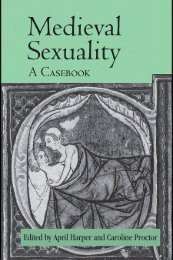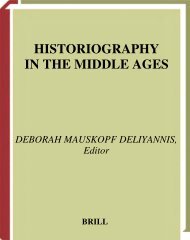Festive Satire: Julian's Misopogon and the New ... - Julian Emperor
Festive Satire: Julian's Misopogon and the New ... - Julian Emperor
Festive Satire: Julian's Misopogon and the New ... - Julian Emperor
You also want an ePaper? Increase the reach of your titles
YUMPU automatically turns print PDFs into web optimized ePapers that Google loves.
I I 2MAUD W. GLEASONwere aware of <strong>the</strong> healing potential of <strong>the</strong> holiday. As Isaac of Antioch observed in <strong>the</strong> fifthcentury, it 'renews <strong>the</strong> ranks of <strong>the</strong> city'.s8But if we consider <strong>the</strong> Kalends to have been a celebration of a generalized social bond,we may wonder why mockery <strong>and</strong> ridicule should have been an appropriate part of it.Before communitas can have its day, <strong>the</strong> world of structure must be dissolved. In <strong>the</strong>hierarchical society of late Roman times, this involved thinking what was almostunthinkable. But <strong>the</strong> mockery <strong>and</strong> masquerades of <strong>New</strong> Year's Eve provided what amodern anthropologist would describe as an opportunity to 'play with <strong>the</strong> factors ofsociocultural experience, to disengage what is mundanely connected, what . . . people mayeven believe to be naturally <strong>and</strong> inevitably connected, <strong>and</strong> to join <strong>the</strong> disarticulated parts innovel, even improbable ways'.s9 Even Asterius saw <strong>the</strong> Kalends -rroy-rr~iaof <strong>the</strong> army as aform of play. 'They practise <strong>the</strong> demeaning arts of <strong>the</strong> stage, a release <strong>and</strong> weakening ofmorals, a game (~t-atGta)against <strong>the</strong> laws whose guards <strong>the</strong>y have been appointed to be.They mock <strong>and</strong> ridicule <strong>the</strong> emperor, using a wagon as a stage, <strong>and</strong> elect him a bogusbodyg~ard.'~" The show also involved <strong>the</strong> cross-dressing of soldiers as women. Reversal ofroles was <strong>the</strong> essence of <strong>the</strong> game: 'The h<strong>and</strong> that once held <strong>the</strong> trophy now spins <strong>the</strong>yarn'. The soldier's role is defined by both his subordination to his comm<strong>and</strong>er <strong>and</strong> hisanti<strong>the</strong>tical relation, as <strong>the</strong> embodiment of virile values, to <strong>the</strong> world of women. Thestructure of hierarchical relationships finds its natural solvent in mockery <strong>and</strong> ritualinsubordination, while <strong>the</strong> anti<strong>the</strong>tical relationship of <strong>the</strong> sexes invites play-acting <strong>and</strong>ritual reversal. The civilian world presents a more varied assortment df statuses <strong>and</strong>consequently a greater number of potential foci of social tension. Thus one function ofsatire in this context, when its targets are fellow-citizens of every rank, is to exp<strong>and</strong> one'ssense of community. Asterius stresses how <strong>the</strong> traditional satire of <strong>the</strong> Kalends afflicts allorders of society: clergy <strong>and</strong> laity, rich <strong>and</strong> poor, children <strong>and</strong> peasant^.^'And <strong>the</strong> emperor? Holiday abuse of <strong>the</strong> emperor was not unknown in fourth-centurySyria. On one occasion <strong>the</strong> citizens of Edessa, 'resenting some treatment <strong>the</strong>y hadreceived', overturned a statue of Constantius <strong>and</strong> thrashed its bronze backside.62Constantius chose to ignore <strong>the</strong> incident. Such behaviour was a festival tradition at Edessa.According to Libanius it wasan old-established procedure, applied to all emperors alike. . . . They say that this practice wasevolved by <strong>the</strong> underst<strong>and</strong>ing of wise men . . . when <strong>the</strong>y sought to satisfy some of <strong>the</strong> gods inthis way <strong>and</strong> feasted <strong>the</strong>m with jocular abuse (~aisPETU-rra161&$AolGopia~~), for <strong>the</strong>m to besatisfied with that <strong>and</strong> to make no fur<strong>the</strong>r dem<strong>and</strong>s of <strong>the</strong> people. Indeed this cannot bedisbelieved, when you see <strong>the</strong>m poking fun at <strong>the</strong>mselves (KWPW~OOVT~~J, <strong>and</strong> <strong>the</strong> notablesamong <strong>the</strong>m providing occasion for a comic race <strong>and</strong> horse-play (TOTS w a ~ a8powov o~cj~wao~).They run this race every year, <strong>and</strong> have <strong>the</strong> immunity of <strong>the</strong> occasion <strong>and</strong> of <strong>the</strong> numbers of<strong>the</strong> participants, not just for what <strong>the</strong>y say, but for absolutely everything that can make <strong>the</strong>festival more enjoyable. And if a governor becomes unjustifiably angry <strong>and</strong> engages on acampaign of punishment, <strong>the</strong>n straightway he is thought to be a petty-minded dunce,-unacquainted with religious cust0ms.~358 Homily on <strong>the</strong> Night-Vigils at Antioch, 30, available Professor of Semitic Languages at <strong>the</strong> Franciscanin <strong>the</strong> free German translation of P. L<strong>and</strong>ensdorfer in School of Theology in Berkeley, for discussing <strong>the</strong>Ausgewahlte Schriften der syrischen Dichter, Biblio- Syriac text with me.<strong>the</strong>k der Kirchenvater (1912). This homily has not59 V. Turner, 'Images of Anti-Temporality: an Essaypreviously been cited in discussions of <strong>the</strong> Kalends, in <strong>the</strong> Anthropology of Experience', HThR 75 (1982),perhaps because <strong>the</strong> author specifies simply '<strong>the</strong> month 253.of Canun', instead of First Canun (December) or 6.Senno adversus Kalendarum Festum, PC 40.Second Canun (January). But <strong>the</strong> occasion is unmistak- 222A. Compare S. Weinstock, 'Saturnalien und Neuable.Isaac was awakened, while visiting <strong>the</strong> city, by jahrfest in den Martyreracten' in Mullus; Festschrift T.night-music in <strong>the</strong> streets: 'The whole city was like a Mauser (1964), 391-400.banqueting hall; <strong>the</strong> night was changed as if into day by6, ibid.<strong>the</strong> singing <strong>and</strong> merry-making that resounded in it'. 62 Lib., Or. XIX. 48.Groups of common people clustered with <strong>the</strong>ir instru-63 Or. xx. 27-8, trans. Norman. Libanius is writingments before <strong>the</strong> houses of <strong>the</strong> great <strong>and</strong> competitively to Theodosius on behalf of <strong>the</strong> Antiochenes after <strong>the</strong> improvised rustic songs. If <strong>the</strong> songs were improvised, infamous Riot of <strong>the</strong> Statues in 387, which by contrast <strong>the</strong>ir content was probably topical. I thank Peter Brown had not taken place during a festival. for showing me this homily <strong>and</strong> Michael Guinan,













